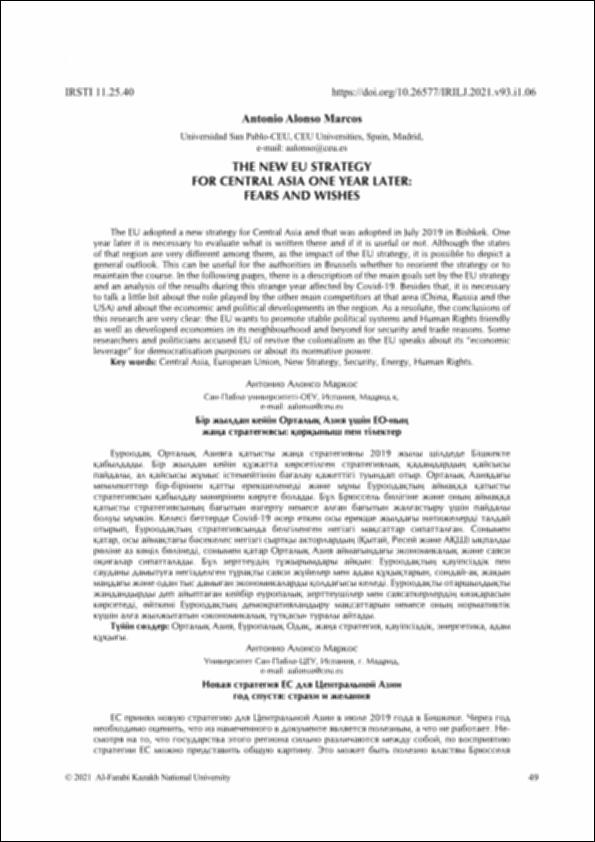Please use this identifier to cite or link to this item:
http://hdl.handle.net/10637/15290The new EU strategy for Central Asia one year later: fears and wishes
| Title: | The new EU strategy for Central Asia one year later: fears and wishes Бір жылдан кейін Орталық Азия үшін ЕО-ның жаңа стратегиясы: қорқыныш пен тілектер |
| Authors : | Alonso Marcos, Antonio Алонсо Маркос, Антонио |
| Keywords: | Central Asia; European Union; New Strategy; Security; Energy; Human Rights; Орталық; Азия; Еуропалық; Одақ; жаңа стратегия; қауіпсіздік; энергетика; адам |
| Publisher: | Al-Farabi Kazakh National University |
| Citation: | Alonso Marcos, Antonio. The new EU strategy for Central Asia one year later: fears and wishes. Revista: Bulletin of the KazNU International Relations and International Law Journal Series. febrero, 2021. Vol. 93 nº 1 - Al-Farabi Kazakh National University |
| Abstract: | The EU adopted a new strategy for Central Asia and that was adopted in July 2019 in Bishkek. One year later it is necessary to evaluate what is written there and if it is useful or not. Although the states of that region are very different among them, as the impact of the EU strategy, it is possible to depict a general outlook. This can be useful for the authorities in Brussels whether to reorient the strategy or to maintain the course. In the following pages, there is a description of the main goals set by the EU strategy and an analysis of the results during this strange year affected by Covid-19. Besides that, it is necessary to talk a little bit about the role played by the other main competitors at that area (China, Russia and the USA) and about the economic and political developments in the region. As a resolute, the conclusions of this research are very clear: the EU wants to promote stable political systems and Human Rights friendly as well as developed economies in its neighbourhood and beyond for security and trade reasons. Some researchers and politicians accused EU of revive the colonialism as the EU speaks about its “economic leverage” for democratisation purposes or about its normative power. |
| Description: | Еуроодақ Орталық Азияға қатысты жаңа стратегияны 2019 жылы шілдеде Бішкекте қабылдады. Бір жылдан кейін құжатта көрсетілген стратегиялық қадамдардың қайсысы пайдалы, ал қайсысы жұмыс істемейтінін бағалау қажеттігі туындап отыр. Орталық Азиядағы мемлекеттер бір-бірінен қатты ерекшеленеді және мұны Еуроодақтың аймаққа қатысты стратегиясын қабылдау мәнерінен көруге болады. Бұл Брюссель билігіне және оның аймаққа қатысты стратегиясының бағытын өзгерту немесе алған бағытын жалғастыру үшін пайдалы болуы мүмкін. Келесі беттерде Covid-19 әсер еткен осы ерекше жылдағы нәтижелерді талдай отырып, Еуроодақтың стратегиясында белгіленген негізгі мақсаттар сипатталған. Сонымен қатар, осы аймақтағы бәсекелес негізгі сыртқы акторлардың (Қытай, Ресей және АҚШ) ықпалды рөліне аз көңіл бөлінеді, сонымен қатар Орталық Азия аймағындағы экономикалық және саяси оқиғалар сипатталады. Бұл зерттеудің тұжырымдары айқын: Еуроодақтың қауіпсіздік пен сауданы дамытуға негізделген тұрақты саяси жүйелер мен адам құқықтарын, сондай-ақ жақын маңдағы және одан тыс дамыған экономикаларды қолдағысы келеді. Еуроодақты отаршылдықты жандандырды деп айыптаған кейбір еуропалық зерттеушілер мен саясаткерлердің көзқарасын көрсетеді, өйткені Еуроодақтың демократияландыру мақсаттарын немесе оның нормативтік күшін алға жылжытатын «экономикалық тұтқасы» туралы айтады. |
| URI: | http://hdl.handle.net/10637/15290 |
| Rights : | http://creativecommons.org/licenses/by/4.0/deed.es |
| ISSN: | 1563-0285 |
| Issue Date: | 16-Mar-2021 |
| Center : | Universidad San Pablo-CEU |
| Appears in Collections: | Facultad de Derecho |
Items in DSpace are protected by copyright, with all rights reserved, unless otherwise indicated.


